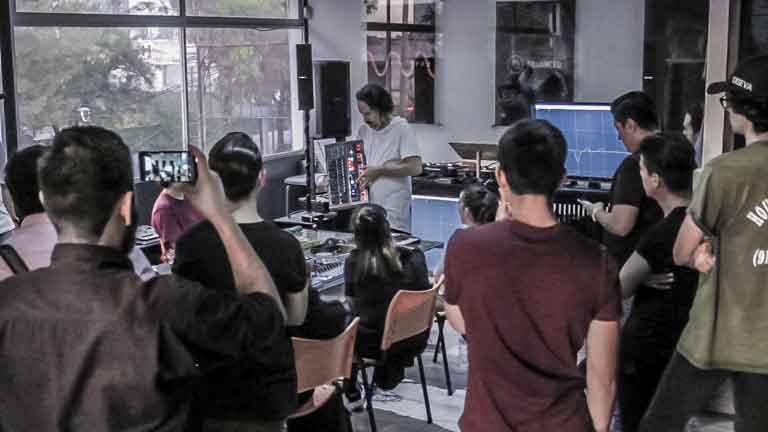Ever since the late ’90s, the French brand specialized in musical software and hardware, has focused on creating products that are accessible for amateurs and professionals. Latin America has been for Arturia more than just a destination for product distribution. In the last few years, it has become a place in which to democratize their tutorials and knowledge, with groups of users that exchange experiences, learn about new software, and even suggest improvements of new ideas to the brand. This initiative is taking place in various cities across Latin America, such as Cali (Colombia), Ciudad de México, Mérida and Guadalajara (México), Lima, Valparaíso, Buenos Aires and recently Santiago. Leaders from the music scene generate events in which Arturias new products are tested, later sharing their experiences. In Chile, Alisú – musician, Dj, and designer from Viña del Mar – is one of Arturia’s user group leaders. A few weeks ago, and with the brand’s cooperation, broadcasted a live session from her home, which was viewed by hundreds of people from different cities in Latin America. In other locations, such as Cali, Caperooza – electronic duet made up by to producers – activated the city’s user group in April.

We would like to know a little about you as the manager of the expansion of Arturia in Latin America. ¿What is your relationship with the music world?
I studied Sound Engineering at a jazz school in France. Then, I worked at a recording studio in France for five years and later created my own in México. Though it was an exciting and intense experience, it was hard to maintain economically. I am becoming more fond of electronic music every day, and I like it when different styles merge. Here, in Latin America, the search for that has caught my attention: musicians are not so worried about the tags or if it corresponds or not to a specific musical style. It is more about experimenting and doing what they like.

¿What is the philosophy at the heart of Arturia?
The first one is figuring out a way to make the most of the new technology that serves the music and producer. The second one is being able to provide exclusivity, making sure each instrument has its uniqueness.
¿How is the initiative Arturia en tu idioma (Arturia in your language) born?
It was my idea because I felt we needed more information in Spanish about the instruments used in electronic music. In my tours around Latin America, I received many comments about the lack of information in Spanish available on the network, and that everything was in English. So, five years ago, we started sharing on YouTube, Instagram, and Facebook all of our content in Spanish. This included tutorials, tricks, lives, and information to inspire our musicians and producers in Latin America.
¿What opportunity did you detect in this side of the world?
There are intense energy and a thirst for knowledge in all Spanish speaking countries that motivates me and inspires me. There is a common culture that genuinely has high strength. Latin America does not represent a large sales percentage when compared to the USA, Europe, or Japan, and for many years, musical brands did not invest much in growing their market. However, musicians and producers from Latin America felt – and still feel –the need for these brands to look at what they are creating here. The good news is that things have been changing lately. The market in Europe is more stable, it has more “bureaucracy” to it, and its customs are hard to modify, leading to a decrease in creativity.
On the other hand, in Latin America, things are moving fast, everyone wants to create, grow, and come up with new ideas. This is a great motivation, at an artistic and sales level. The complicated part of this is that economy is not very stable, and many distributors are not used to selling instruments with new technology, so they are shy about it.

¿How does the User Groups Asturia begin, and what need did it come to meet?
The project started about four years ago – after Arturia in your language – based on what Ableton does with user groups, which was an inspiration to us. I would say we are like siblings, brands with a common style, with a similar age and generation. The great difficulty for Arturia is we have a wide variety of equipment and software, which makes it difficult to focus on one at a time. I started the project, and Arturia asked me to develop it around the world. It is not a project that bares many results everywhere because I don’t have the time to look into each one. But in Latin America it is working well, it is where there is more interest. There is a lot of community spirit here. The goal is for the group leader to organize events at least once a trimester around a subject related to Arturia.
In what way is Arturia supporting local music producers with this program? How has this been received?
At the moment, it is difficult to measure the people’s satisfaction, but we have witnessed their gratitude regarding what they can learn by sharing and acquiring new knowledge. More users are joining the groups regularly, and we are open to receiving proposals from users from cities where there are no user groups. We are currently active in seven cities in Latin America, and hopefully, we will reach more. It only takes a musician to contact us through our Facebook page, and we’ll see if the conditions needed for a group are met in their city. We hope next year there is someone from Arturia in charge of this.
What motivates you to keep working in Latin America?
What motivates me is the energy and warmth of artists and producers from the User Groups. No day goes by without a new idea or project from one of the leaders. I write down all of the suggestions I get and send them to the Product Managers in France. It is the best way of creating a new product.
How would you define, in a few words, what characterizes the music producers in Latin America?
A robust, unique culture mixed with a reception towards the world.

In your opinion, which are the challenges faced by artists, producers, and electronic music creators? How about instrument fabricants?
For the first group, in my opinion, the challenge lies in how to make music that catches attention. There are many instruments available, accessible, and so many producers that can easily share their work online that I find it difficult for the audience to pay attention to all of it. Having a different sound and standing out is complicated. It is also difficult to live from electronic music because there are more producers every day, but it was always hard. For manufacturers, the challenge lies in creating a new instrument in a time in which ¡so many – cheaper – options are available. It is a lot of investment, and it takes around 3 to 5 years of development. Plus, if you make a mistake, you can sink. However, if you do nothing new, musicians get bored and turn out to other brands.
What would you say to new creators?
I would tell them there is no reason to be afraid if you are going through an unmotivated season, and that it is good to make due dates for yourself, even if the products are not 100% ready. They are never 100% ready, and a long time can go by if the products are not launched. I see significant growth in Latin America in terms of music production. Many musicians are coming out into the world, especially women; I see more entering the world of electronic music every day.

Do you think Arturia has changed electronic music?
I don’t know if Arturia has made a change or if we were lucky enough to be in the right place at the right time. But I do believe that, with other brands, we have been propelling the market by proposing more accessible electronic music instruments.
What are the products you are promoting at the moment? Which of them have successfully entered the markets?
Every product family has popularity strikes, but lately, what has been sold the most (nearly 80%) are midi controllers and sequencers. The hard thing is to know what will happen 3 years from now. We had been working in machines that were 100% analog until about 2 years ago. Now we are in the digital era. Who knows what will happen in the future. I believe exciting things will emerge from samplers.
Can you give us a preview of what Arturia is working on now?
We are working on the V Collection, for it to grow in legend instruments. Surely before the end of the year, we’ll have something. We are also working on new hardware instruments in the line of Microfreak for more modern productions, using the best of the digital world to create crazy sounds. A lot of new things are coming within the next 12 months.

